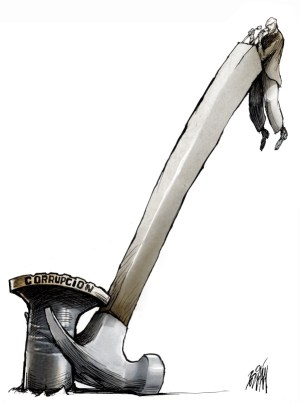Perceptions of Political Corruption
Too Often the Harbingers of Stark Reality

Perceptions are too often the harbingers of stark reality. This is especially true when it comes to questioning the ethics or illicit acts of local government officials. While spending nearly 25 years in the FBI and convicting a number of local, state, and federal officials on corruption charges, it did not take long for my colleagues and I to learn how to spot those who had crossed the bright line into unethical, and sometimes corrupt, behavior. In most cases, worrisome perceptions had run rampant in the community that something was wrong. For those of you who may not have knowingly experienced such behavior in your own community, and for purposes of this article, let me give you a quick homegrown lesson in what that malfeasance smells like.
Simply put, political corruption is the use of official power by government officials for illegitimate personal gain. Unfortunately, there is too often a laissez faire attitude among the honest leaders in the community where perceptions of a problem are ignored or merely swept under the rug. Those perceptions are often the by-products of cronyism, influence peddling, bribery, or extortion. Common denominators usually found in that cesspool were politicians who evinced haughty arrogance, claimed accomplishments that were really not theirs to claim, were already chasing their next higher office, and were suspiciously secretive in many of their political and/or personal dealings. When challenged on any of these traits, they hurl unsupported denials and vehement insults toward their inquiring constituents. Becoming mired in their own subconscious self-perceptions of economic and societal preeminence, some even began donning flashy and expensive clothes and lifestyles in efforts to imply superiority over their work-a-day constituents. It normally did not take long for the FBI to quickly discover an illicit or unethical nexus between the politician’s official duties — or the neglect of same — and the community perceptions of a serious problem with the official’s fair and unbiased service to their constituents.
Criminal law requires a willing relationship between a government official’s duties and a corrupt act such as, for example, a large campaign donation intended to facilitate certain legislation or other official act by that official to benefit a crony — in other words, a quid pro quo. Upon close inspection by trained investigators, the proscribed relationship between the official and the co-conspirator becomes apparent. It can also surface when those plotting the scheme covertly agree to conceal their being symbiotically joined at their hip pockets. In today’s electronic world of emails and high-speed research, such concealment rarely lasts, and the act, or the perception of one, pops to the surface at the most unexpected times, such as right before an upcoming election. When challenged on such an apparency, they give diversionary or evasive statements in an effort to conceal their conspiratorial union. Sound familiar?
In politics, unethical skullduggery undermines good government and, in the long run, democracy itself. And, lest we forget, the roots of our democracy are at the local level. Unscrupulous double-dealing can infect and pervert our systems of governmental accountability at all levels. Media exposé of such duplicity can provide evidence-based confirmation of even more underhanded chicanery being uncovered at that local level. Voters need to remember that fact as they go to the polls on March 3.
But, there is more to remember. Shameless unethical actions at any level of government almost always result in the loss of anticipated government revenues and taxes, the shrinkage or disappearance of long-standing business enterprises and tourism that cannot compete in those environments — and, most importantly, an inevitable decline in confidence in our government officials and agencies.
Another less obvious fallout from unethical or illicit alliances and actions at the local level can, at times, be seen in our education systems. As we all know, education is where our children are provided their first basic understandings of how our society operates — especially its mores, its customs, its rules, and its practices — all of which define our fundamental values. Any rupture in that chain can have long-term debilitating impact on our children.
So, what are citizens to do when there are visible 24/7 products of scandalous schemes impacting a community in the plain view of its children and youth? And, what if the shameless political co-opting of the teachers and administrators — the guardians of any education system — is left unaddressed? The children will have been exposed to the sprouting seeds — literally right under their noses — of the seamiest sectors of a community. Sound familiar?
A citizenry, however, must have the courage to take a stand and just say, “No, we’re not going to take it any more!” It must have the will to support, and then vote to elect, ethical leaders echoing that commitment. Only then can they reverse and defeat the scourge of such unethical behaviors. Otherwise, it inevitably creates long-lasting dark clouds over our homes, our schools, our towns, our leaders, and our values. That reversal and defeat has to start at the ballot box! Think about it before you vote!
Thomas R. Parker is a retired assistant special agent in charge of the Los Angeles Regional FBI Office and a former City of Santa Barbara Fire and Police Commissioner. He has lived in Santa Barbara for the past 13 years.




You must be logged in to post a comment.